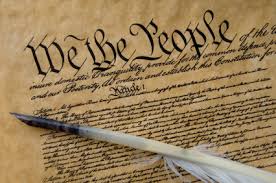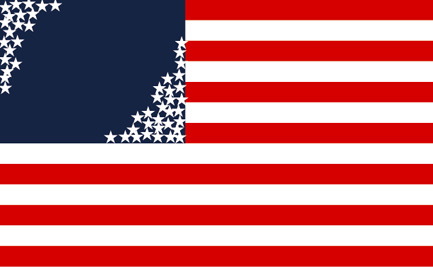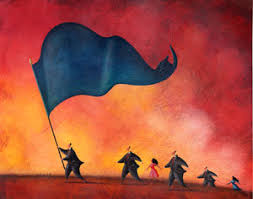
In the second installment of attempting to read the Constitution, I've read Article One. I won't reprint it here as it is quite
lengthy. I'll try to give you the highlights.
Section 1: The Legislature will be bicameral - a House of Representatives and a Senate.
Section 2: Rules of The House: House members will be elected every two years. They have to be at least 25 years old and have been a citizen of the US for seven years.
And here's where it already starts to get sticky. The original section apportioned the number of representatives according to the number of free people, including indentured servants, but excluding "Indians" and counting all other people as three fifths of a person. The 14th amendment changed that to a formula that counts all male inhabitants, excluding Indians, except those that are not allowed to vote because of rebellion or some other crime.
Clearly, we've got this whole 'liberty for all' thing mucked up already. The government didn't consider either Native Americans or the Africans they brought over to work for them eligible for this notion of freedom or representation. Let us continue.
The House has the right to choose its own leaders and has the sole right of impeachment.
Section 3: Rules of the Senate. The Senate will have two members from each state chosen by that state's legislature. Each Senator will serve a term of six years and have one vote.
That rule was changed in the 17th amendment to make the selection by popular vote.
Senators have to be thirty years old, have lived in the country for nine years and must reside in the state from which he is elected. The Vice President shall be president of the Senate but only has a vote which counts in the event of a tie. The Senate has sole power to try all Impeachments and must have a two thirds vote for a conviction. Impeachment convictions will result in removal from office and a ban on further positions of trust but do not preclude separate criminal cases.
Section 4: Elections and meetings. Congress must meet at least once every year in December (changed to January in the 20th Amendment) and elections shall be set up by individual states.
Section 5: Neither House can adjourn for more than three days without the concurrence of the other. Both Houses must keep a journal in which all business is recorded and published on occasion "excepting such Parts as may in their Judgment require Secrecy". Each House is in charge of its own discipline, its own rules, and may, with a two thirds majority vote, expel a member.
I see no notation that that secrecy provision was ever amended. I find that interesting. So secrecy on the Hill was a part of the original Constitution.
Section 6: Compensation. This one's short - I'll copy it in total. Section 6 - Compensation
(The Senators and Representatives shall receive a Compensation for their Services, to be ascertained by Law, and paid out of the Treasury of the United States.) (The preceding words in parentheses were modified by the 27th Amendment. That says no change in pay can be instituted until after an election cycle for the House of Representatives.) They shall in all Cases, except Treason, Felony and Breach of the Peace, be privileged from Arrest during their Attendance at the Session of their respective Houses, and in going to and returning from the same; and for any Speech or Debate in either House, they shall not be questioned in any other Place.
No Senator or Representative shall, during the Time for which he was elected, be appointed to any civil Office under the Authority of the United States which shall have been created, or the Emoluments whereof shall have been increased during such time; and no Person holding any Office under the United States, shall be a Member of either House during his Continuance in Office.
Okay, there's enough for now. There are three more sections in Article One and they deserve a separate post.
So far I see racism, elitism and secrecy. Practical, perhaps, in a country that is designing itself from whole cloth. But not exactly the democracy that we are taught in the classroom.
I shall continue reading.
http://www.usconstitution.net/const.html









